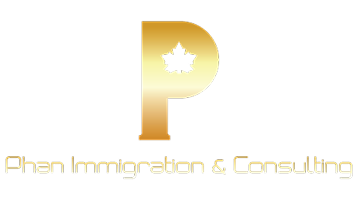Author: Nolan Clack,Guest blogger
Ignite Your Dreams by Studying Abroad in Canada!
Studying abroad in a foreign country is an exciting and big decision to make! There is an abundance of benefits and opportunities why you should consider studying abroad in Canada.
For instance, Canadian cities are amongst the most diverse in the world, making it a great location for international students to learn about other cultures all within one country. Not only that, the country ranks consistently as a top destination globally for international students to study abroad in Canada. Canada’s multicultural cities are a great place to connect with people from different cultures to make your studies in Canada that much more enriching.
It is important to ask yourself these questions to set yourself up for a path to success when looking to embark on a journey to study in Canada:
- What are the benefits of studying in Canada?
- What is the cost of studying in Canada?
- What programs are available?
- Which province should I study in?
- What are the costs of housing?
- How much will it cost for monthly living expenses?
- How do I apply for a Canadian student visa?
- What are the costs of a Canadian student visa?
- Can I work after my studies?
- Am I eligible for Permanent Residence and Canadian Citizenship after my studies?
As you can see, there are a number of things to consider beforehand. Knowing all the steps and how to proceed with them is the key to succeeding to ignite your dreams of living and studying in Canada.
To no surprise, Canada is one of the most popular countries for Vietnamese international students. There is a range of benefits for Vietnamese students to call Canada their home during their study abroad program. Canada offers a range of opportunities and experiences to develop strong foundation skills, meet new people and excel in your chosen career path.
If you are looking to embark on a new adventure as an international student in Canada, we have compiled a comprehensive list of everything you need to know about studying abroad in Canada as an international student.
Benefits of Studying in Canada

Studying in Canada has a list of benefits that will provide you with the confidence and credentials that are highly recognized worldwide to help you ignite your dream to go further. Before we get into the costs of studying in Canada and application procedures, we’ve compiled a list of benefits why you should consider Canada to be your next study destination.
- The cost of studying in Canada is considerably cheaper than in other countries
- Student visas are issued for the entire duration of your program
- You can work while studying to help reduce the cost of studying in Canada
- Gain invaluable work experience after graduating that qualifies you to apply for a work permit that allows you to work in Canada 3 years after graduation
- Eligible to stay permanently in Canada by applying for permanent residency
- Lastly, apply for Canadian Citizenship after meeting residency requirements
Canada’s Education System
Canada’s public education system provides high-quality teaching from young learners to adults which is well-funded and overseen by the Federal Government. Each province in Canada manages the school board districts; therefore rules, fees and requirements vary slightly from each province. Regardless of the provincial management, the federal government ensures the highest education standard that remains consistent for international students during their study abroad program.
Canada’s education system is broken down into three levels. Those levels being:
- Primary: Ages 4 – 14 years of age (Kindergarten to Grade 7)
- Secondary: Ages 14 – 18 (Grade 8 – 12)
- Post Secondary: Ages 18 years or older (College, Undergraduate, Postgraduate Studies)
When researching study abroad programs in Canada, select the corresponding level of studies and read more in the following sections to learn about tuition fees, programs available and non-tuition expenses.
Costs of Studying in Canada as an International Student

1.0 Study Abroad Programs While Studying in Canada
Primary School (Kindergarten – Grade 8)
Within the Canadian school system, primary schools consist of the ages between 4-14 years old. As an international student studying in a primary school, the cost of studying in Canada will vary greatly depending on the province of residence, and school district. The great news is that studying in Canada is much more affordable compared to other G7 countries!
Primary School Calendar and Hours
The school year in the primary Canadian education system usually starts in the first week of September and goes till the end of June. Class times in Canada are scheduled from Monday to Friday with schools being closed on the weekends. Primary school hours are from 8:30 am to 3:30 pm and usually have a lunch break for an hour. Students also receive two 15 minute breaks in between classes to eat a snack and play.
Secondary School (Grade 9 -12)
Within the Canadian school system, secondary school consists of the ages between 14-18 years old. As an international student studying in secondary school, the cost of studying in Canada is based on the city school district, which is typically the same cost as primary school. Although additional tuition fees are expected to cover school textbooks and extracurricular activity expenses that occur throughout the school year.
Secondary School Calendar and Hours
Like the Canadian Primary school system, the school year for secondary school starts in the first week of September and goes till the end of June. Class times are shorter than elementary school and are scheduled between 8:30 am to 2:30 pm from Monday to Friday with weekends off. Canada’s study abroad programs for secondary level shorten school hours to allow for extracurricular activities such as school sports.
Available Language Programs
When selecting a primary or secondary school program, parents or guardians must consider if they wish to send their child to an English, French or dual language institution during their study abroad program. Due to Canada’s two official languages, each province will offer the choice of one or both languages based on the parent or student’s preference.
Cost of Studying in Canada – Primary and Secondary Education
In the table below can be seen the costs of studying in Canada as an international student based on provincial school boards. Fees are applicable to both primary and secondary school education. Note that medical insurance is compulsory for international students to study in Canada. Each province has its own sets of policies that either include or do not include emergency medical insurance within their annual tuition.
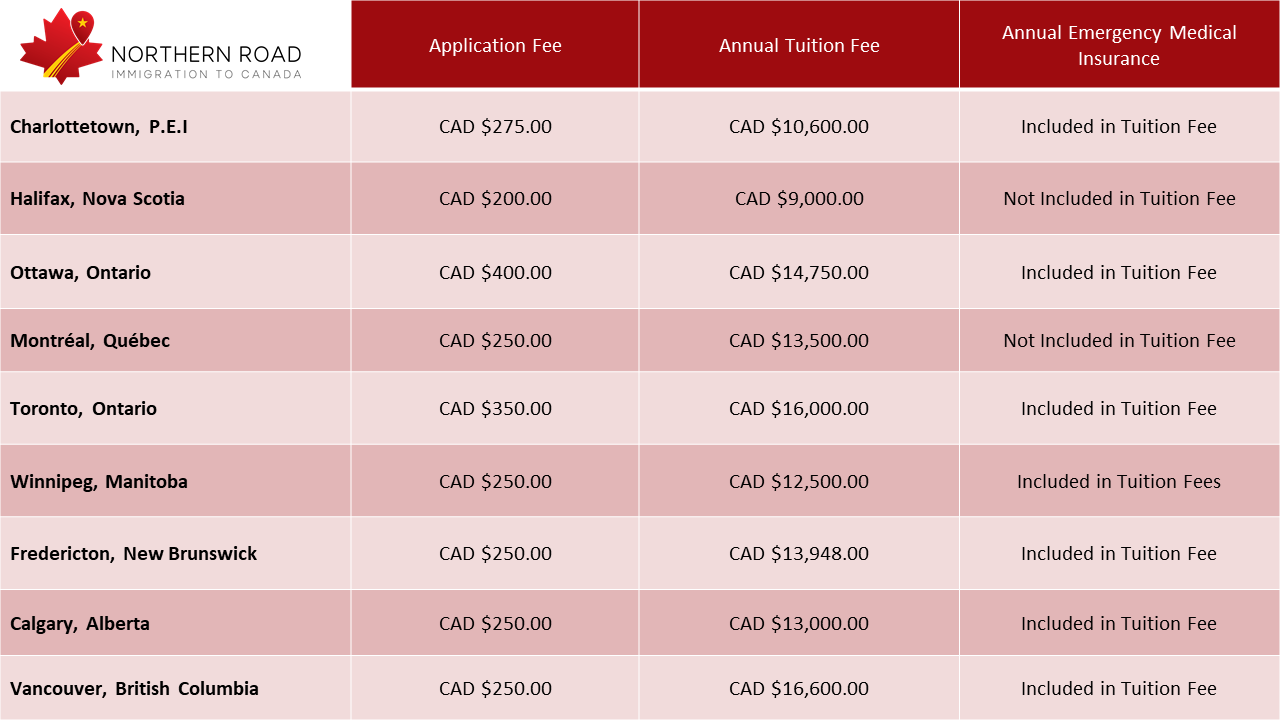
Additional Fees
When studying in Canada, each school may have its own set of additional fees to be paid upfront or throughout the school year. Below are some of the following items that may be applicable:
- School Books
- School Lunch
- Sports Teams
- School Field Trips
- Bus Transportation
- Travel Insurance
College and Vocational Training (2 – 3 Years)
College programs in Canada tend to be shorter in length; therefore, the cost of studying in Canada under a college or vocational program is often less expensive than studying at a Canadian university. Depending on the program chosen, a work-integrated learning environment can be included, which may provide students with an additional income to reduce the costs of studying in Canada. Some example programs that might include a paid work-integrated learning environment are:
- Welding
- Electrician
- Carpenter
- Mechanical Engineering
- Chemical Engineering
- Civil Engineering
- Computer Engineering
- Environmental Technician
- Fire-Fighting
High-quality education is widely available in colleges and vocational programs throughout the country. This also includes outside of the bigger cities, where students can find a lower cost of living. Regardless if you decide to study in one of the major cities, the cost of living is still affordable compared to many big cities around the world.
Cost of Studying in Canada – College and Vocational Programs
The cost of studying in Canada under these programs varies greatly depending on the program and the location you decide on. Typically, college and vocational programs can range anywhere from CAD $2,000.00 – $18,000.00 per year for tuition. Although on average, the typical cost of studying a college or vocational program is approximately CAD $12,000.00.
Undergraduate Studies (4 Years)
Choosing to study for a bachelor’s degree in Canada is a great choice! Students during their 4 years of study get to experience Canada’s beautiful landscape and build long-lasting friendships during their study period. Canada offers reputable programs in small and big cities, both of which offer high-quality education that is recognized globally.
Much like the college and vocational programs, the cost of studying in Canada for a bachelor’s degree will vary on location and the type of program.
Therefore; we recommend that you first select a program that interests you. From there it’s much easier to explore which city and province best fit your lifestyle and cost of living.
Average Annual Tuition Fees by Field of Undergraduate Studies
Source: Statistics Canada
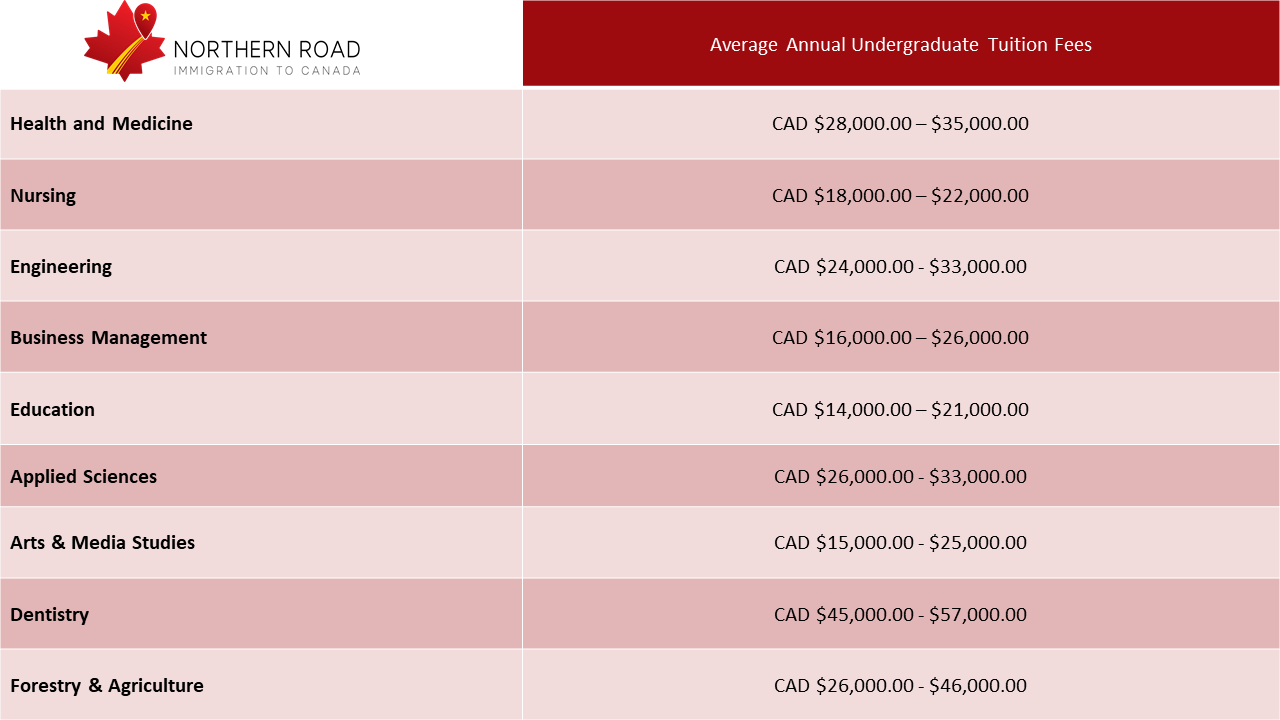
Annual Average Tuition Fee for International Students by Province
Source: Statistics Canada
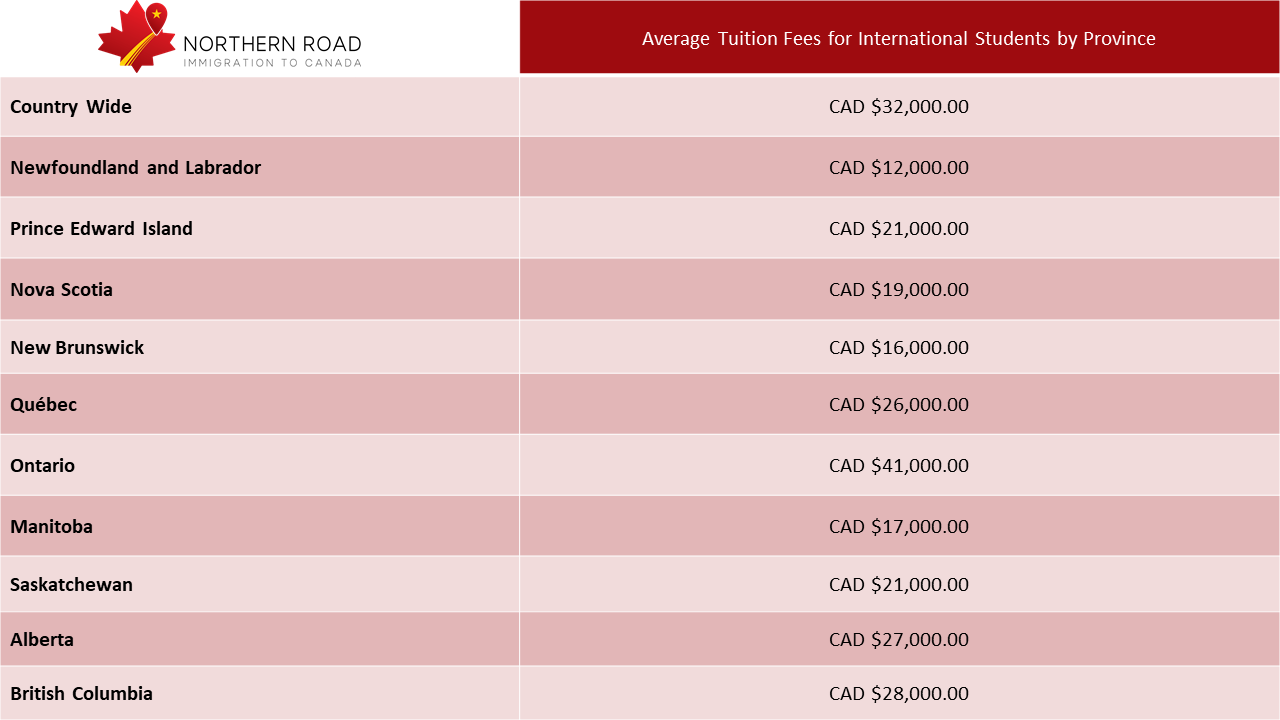
As it can be seen from the table above, the cost of studying in Canada varies heavily by province and field of study. This is why we recommend selecting a program, then a province to help research and identify criteria that best suits your budget.
Postgraduate Studies (1 – 4 Years)
Postgraduate studies in Canada take anywhere from 1 – 4 years to complete, depending on if you enroll in a master’s or Ph.D. program. Enrolling in a Canadian graduate studies program is a smart investment that will provide an extra edge and competitiveness in the global market. The best part? The cost of studying in Canada for a master’s or Ph.D. program is very low cost and highly recognized around the globe. Making it an appealing country for international students looking to access higher education.
Average Cost of Studying in Canada by Tuition Fees and Field of Study in Postgraduate Studies
Source: Statistics Canada
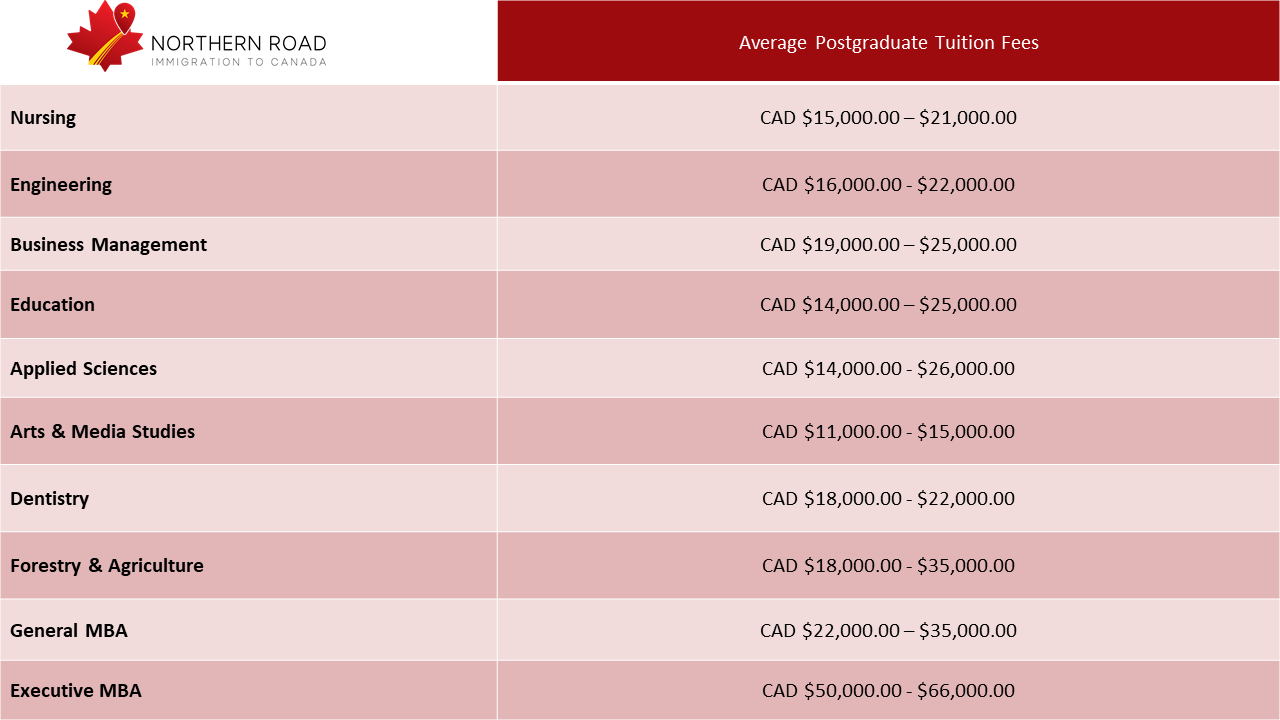
It is important to note that most master’s programs in Canada are 12 months in length. The table below highlights the total average cost of an entire 12-month program. For international student Ph.D. enrollments, the figures below must be multiplied by four to get the average total cost of a Ph.D. program.
Canadian Language Schools
Accredited language schools are available for international students across all major cities. Language courses are typically run anywhere from 12-24 week periods. The cost of studying in Canada for language studies is readily affordable.
The tuition fees in the table below are based on the total cost per week, with class times averaging 6 hours per class one class a week. The below tuition fees do not include housing or meals.
Average Cost of Studying in Canadian Language Schools in Major Cities
Source: Statistics Canada
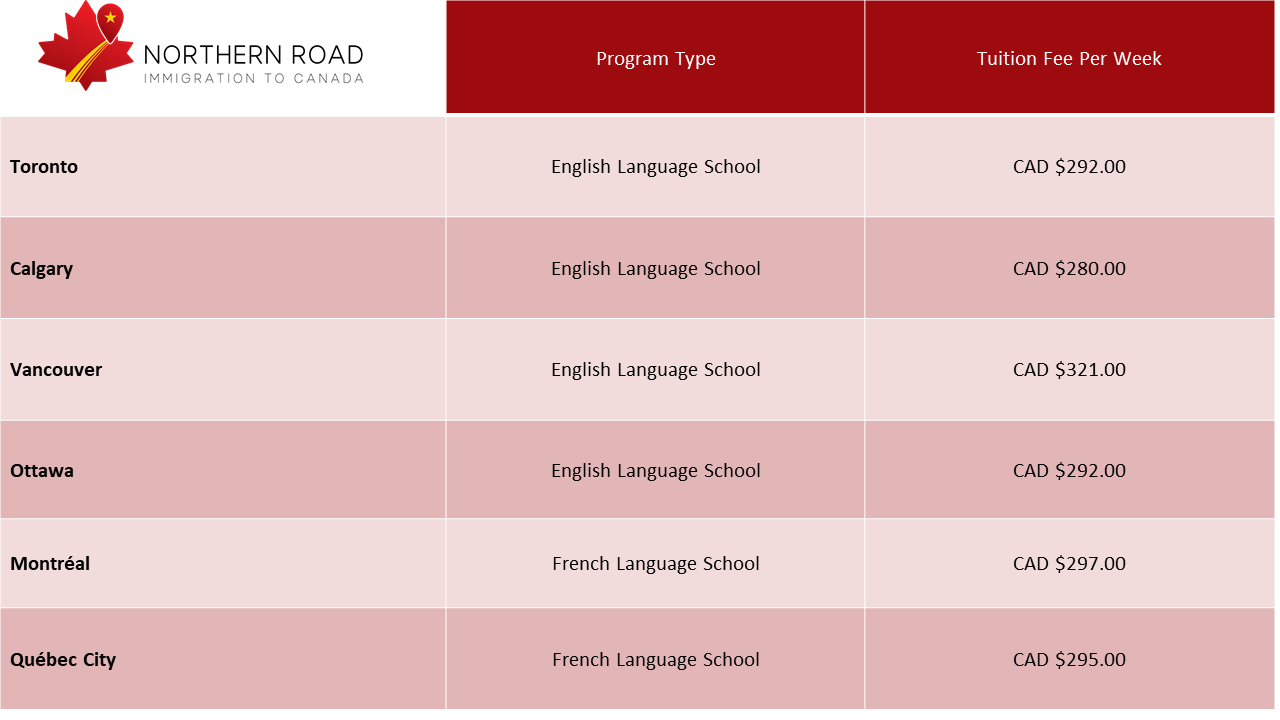
Non-Tuition Expenses For International Students

Non-tuition costs of living in Canada will greatly depend on the city you wish to study in. Housing, food, utilities, and transportation will all have a big difference in price based on your chosen city.
To minimize your expenses we’ve compiled three options that international students can choose from for living arrangements. Depending on your lifestyle and what you’re looking to get out of your study abroad program, all three options are equally great!
Accommodations When Studying in Canada
Rent
Privately renting an apartment or complex is an option available for international students; however, the price of rent can be quite high, especially when located in major cities.
International students on their study abroad program usually tend to share accommodations with other students to reduce the overall housing costs. A whole house is generally too expensive for one person, but it is quite common for 3 or 4 students to share a house rental – making it much more affordable. These types of homes are usually anywhere from 165-200 square meters, which includes a full kitchen, two or three bathrooms, private bedrooms and often come with a fenced-in backyard.
Some colleges or universities might offer off-campus options, which provide much more affordable pricing than private landlords. These college and university rental locations are typically only a ten to fifteen-minute walk away from the institution and have all amenities international students need during their study abroad program. However, these locations are quite competitive and require planning long-term in advance. It’s best to ask your college or university ahead of time so they can help find a place and roommates before your arrival if you wish to go with this option.
School Dormitories
School dormitories are great options for students that are looking to make friends and settle into a new life during their study abroad program in Canada. Dormitories are owned and managed by the educational institution and often come with basic furnishings such as a small kitchen and bathroom to be shared with other students. Some rooms might be shared with other students, but are always separated by gender.
Choosing to reside in a dormitory is a quick way to make friends with other international students that have resided in Canada before your arrival. School dormitories are also ideal if you plan to be involved with activities happening around campus such as sports teams and other recreational activities.
Homestays
Homestays are also a common accommodation choice for international students during their study abroad program in Canada. Homestays are Canadian families that welcome international students to stay with them throughout the school year. These families are often contracted by the school, college, or university to support international students in their welcoming and life in Canada. Host families must undergo a series of checks and verifications to ensure that members of the household do not have criminal records and that they can provide a safe and secure environment.
Homestays are a great option if you are not confident with your language abilities. Staying with a friendly Canadian family will quickly help you sound like a native speaker and support you with any questions or concerns you may have while residing in Canada during your study abroad program.
If this is an option that interests you, schools, colleges, and universities usually match international students with families that have similar interests, location preferences, and types of amenities. International students will receive a fully furnished room, home cooked Canadian family meals, and are always invited to activities with the rest of the family.
Source: Statistics Canada
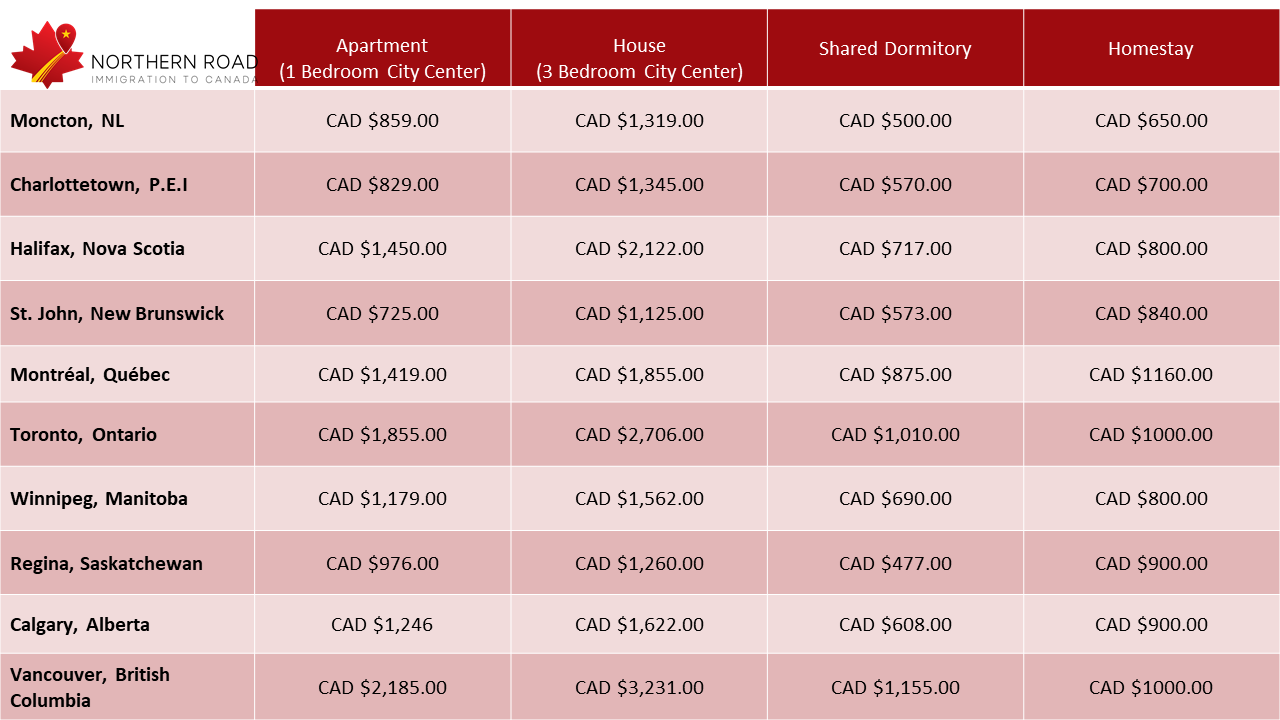
As an international student on a study abroad program, it is also important to consider the cost of home utilities each month. During the spring and summer months, electricity bills range anywhere from CAD $100 – $150 per month, depending on electricity and water use. In the fall and winter months, electricity costs range from CAD $175 – $300 per month to keep accommodations warm during the cold weather. For WIFI, students can expect to get student rates ranging anywhere from CAD $45.00 – $85.00 a month depending on the city of residence. Home utilities do not apply for students who choose to stay at a homestay and are included in the monthly cost.
Other Expenses
Another expense to consider during your study abroad program is the cost of food. Each province has minor cost differences, but it is good to estimate anywhere from CAD $250.00 – $400.00 a month if purchasing groceries and eating at home. The cost of a basic meal at a non-expensive restaurant ranges anywhere from CAD $15.00 – $20.00. To enjoy outings with friends, we suggest you set a monthly budget for eating at restaurants. The cost of eating out can quickly add up if you don’t plan for them beforehand.
As an international student in a study abroad program, cities provide student rates for transportation and cell phone plans. Depending on the city of residence, monthly public transport ranges from CAD $75.00 – $110.00 a month with a city transportation pass. Cell phone student plans start at CAD $75.00 a month and go higher depending on the additional add-on features you wish to include within your yearly cell phone subscriptions.
It is highly recommended that international students should factor in all the non-tuition and tuition expenses to know your total costs to study in Canada.
2.0 How To Apply For Your Canada Student Visa
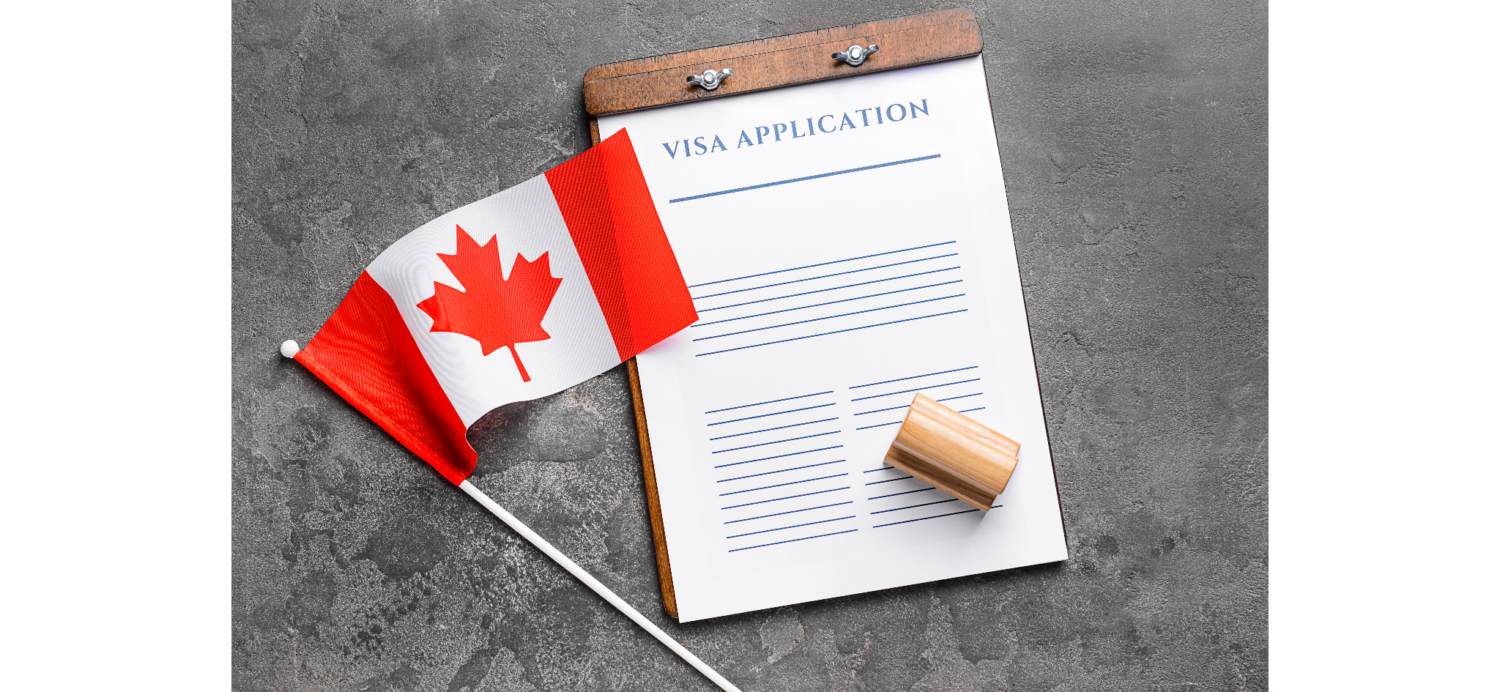
There are a few ways that you can apply for your Canada student visa. The application is completed online and processed either in Canada or at a visa office overseas. Let’s take a look at the two options.
2.1 The Student Direct Stream
Ready to apply for your Canada student visa? Have you heard about the Student Direct Stream (SDS) program? SDS is Canada’s fast-track access to your studies! If your application meets the requirements and you do not have any inadmissibility concerns, the process is completed within 20 days in most cases.
2.1.1 Requirements For the Study Direct Stream Program
The SDS program is only applicable for those seeking post-secondary studies in Canada. For applicants to qualify for a Canada student visa under the program, the following requirements must be met. This means that not meeting one or more of the requirements will render the applicant ineligible for the SDS program.
Designated Learning Institution (DLI): You must be accepted into a postsecondary program. A DLI is a learning institution that is registered and allowed by the Canadian government to receive international students and it grants the student access to the post-graduation immigration programs.
Tuition: To be accepted, you must have paid at least one year of tuition to the DLI. Students can choose to pay the entire tuition fees if they want but it is not necessary to qualify for the SDS program.
Medical Examination: Students must complete an upfront medical examination. This means that the medical examination must be completed before sending the application for a Canada student visa.
Guaranteed Investment Certificate (GIC): Applicants must purchase a GIC of at least CAD $10,000.00 from a participating Canadian bank. This certificate alleviates the need to show extensive proof of finance to study in Canada as part of your Canada student visa application. What is a GIC? It is a financial product that is secured and guaranteed by the bank and by the government of Canada. Most banks offer this product online and money can be electronically transferred to the financial institution.
Language Tests Results: students must provide proof of language tests in either French or English to be eligible for the SDS Canada student visa.
- If you choose to study in English, your IELTS test results must show a score of at least 6.0 in each language skill: listening, reading, writing, and speaking.
- For French, your TEF results must be equivalent to a Canadian Language Benchmark score of at least 7 for each band. More precisely you must have a score of at least 310 for speaking, 249 for listening, 207 for reading, and 310 for writing.
2.2 The Regular Stream

The regular stream for a Canada student visa has similar requirements to the SDS program but there are a few differences. This category applies to both primary/secondary students and post-secondary students who do not qualify for SDS.
The most important difference is that the processing time for a Canada student visa under the regular stream will not be 20 days but will vary depending on the volume of applications received by the visa office at the time of your application.
2.2.1 Requirements For the Regular Stream
Designated Learning Institution (DLI): This requirement is the same as the SDS stream. You must be accepted in a program of study regardless of the level you are applying for. In Canada, all primary and secondary schools are automatically considered DLI by default.
Tuition: To be accepted for a Canada student visa, you do not have to pay the first year of tuition to the DLI, unlike the SDS program. However, students are encouraged to do so to help establish their proof of finance to study in Canada.
Medical Examination: Students do not have to complete an upfront medical examination. During the processing of your Canada student visa, if you are found eligible, you will be asked to complete the medical examination by a visa officer. However, students can still choose to complete the medical examination before sending a Canada student visa application to help accelerate the process.
Proof of finance to study in Canada: Applicants must be able to prove that they have sufficient funds to pay for the tuition fees and support themselves during their stay in Canada. Therefore, you will have to provide more extensive proof of finance to demonstrate that you can study in Canada. Here are some examples of the type of proof you may choose to submit:
- Business Documents
- Tax declaration
- Bank statements
- Employment contracts
Language Tests Results: Language test results are not mandatory for this stream. Students are still encouraged to complete a language test since most institutions will most likely require one either to be accepted in the program or to assess whether the student will require language training in Canada. The language test results can still be included to substantiate the Canada student visa application.
2.3 Other Requirements
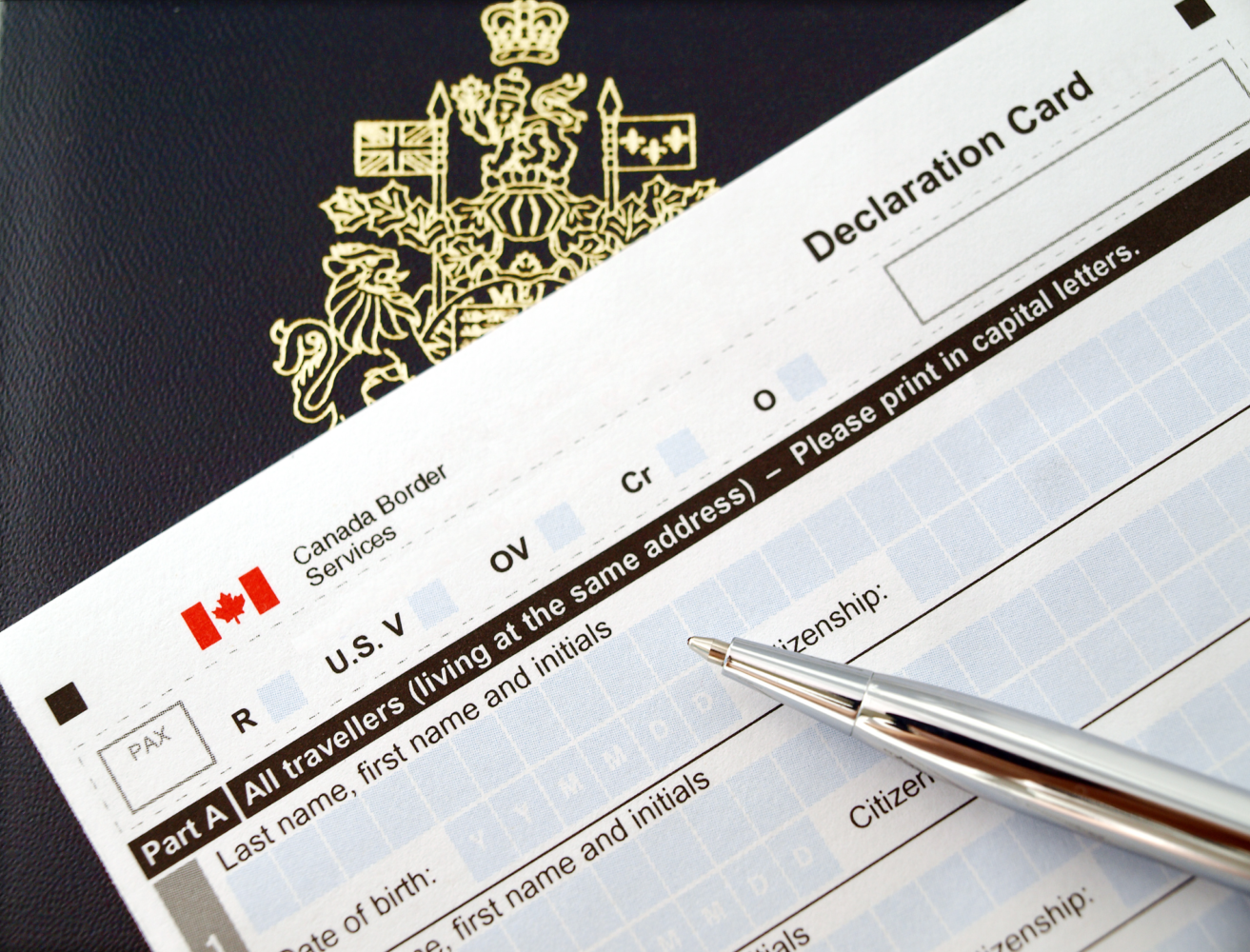
For your application for a Canadian student visa to be complete, you will be required to submit a few more very important documents. These requirements apply to both the SDS and regular streams.
Valid Passport: Without a passport, you will not be able to secure a Canadian student visa. We highly recommend that your passport be valid for at least the duration of your studies in Canada. Why? Because if your passport does not cover the length of studies in Canada, your Canadian student visa will be issued to the validity of your passport and will need to apply not only for a new passport while you’re in Canada but also for a new Canadian student visa.
Police certificate: If you are over 18 years of age you will have to provide a police certificate for every country you have lived in for more than 6 months. The police certificate is meant to satisfy visa officers that you are not inadmissible to Canada due to a criminal record. In Vietnam, you must provide Judicial Certificate #2 or Criminal Record Certificate #2 (Phieu Ly Lich Tu Phap So 2). You can find more information on how to obtain a police certificate for other countries on the IRCC website.
Biometrics Enrollment: After your application for a Canada student visa is received at the processing office, you will receive a ‘Biometrics Instruction Letter’. You will then need to make an appointment at the nearest Visa Application Center to complete the collection of your biometrics. There are two locations in Vietnam: Ho Chi Minh City and Hanoi. Once your biometrics collection is complete, the results will be sent electronically to the processing office. The results of your biometrics enrollment are valid for 10 years and can be reused for other types of visa applications or in case of a subsequent Canada student visa following a refusal.
2.4 Cost Associated to a Canadian Student Visa
Here is the list of the fees you can expect to pay for your application.
- CAD $150.00 per person for each Canadian student visa.
- CAD $85.00 for the biometrics enrollment per person.
As mentioned above, your biometrics results are valid for 10 years. Therefore, you can expect not to have to pay this fee if you apply for a new visa within that period.
3.0 Post Graduation Immigration Programs

Once you have completed your studies in Canada, a few immigration programs are available and very attractive for international students to stay in Canada. Here are 3 high-value programs.
3.1 Post Graduation Work Permit
If you have studied at a Designated Learning Institution (DLI), you are therefore eligible to apply for a post-graduation work permit, more commonly known as a PGWP. The PGWP is issued to students who have graduated from a post-secondary institution only.
To qualify, your program of studies had to be of at least 8 months. The PGWP validity is based on the length of the program of studies taken while in Canada. PGWP can be valid for up to 3 years! Let’s look at some examples.
- If your program was for 8 months, your PGWP will be valid for 8 months.
- If your program was for 1 year, the PGWP will be valid for 1 year.
- If your program was for 2 or 3 years, your PGWP will most likely be valid for 3 years.
Students who come to Canada to study English or French as a second language are not eligible for the PGWP.
3.2 The Canadian Experience Class (CEC)
The Canadian Experience Class (CEC) is a permanent residence program that allows graduating international students to apply for a visa to stay in Canada. Let’s take a quick overview of the program.
To qualify under the CEC program, applicants must demonstrate that they have held full-time skilled employment of at least 12 months, or a combination of part-time employment of a maximum of 24 months, in the past 3 years. Effectively, this means that students who obtain a PGWP can apply for permanent residence after 1 year of skilled employment.
3.2.1 What is skilled employment?
Canada has categorized employment in different skill sets. For instance, there are many levels of skilled jobs. The National Occupation Classification (NOC) list divides into 5 categories:
Skill type 0 = Management jobs
Skill type A = Professional jobs with university/college degrees
Skill type B = Technical jobs, skilled trades
Skill type C = Intermediate jobs requiring high school degree
Skill type D = Labor jobs
Only skill types 0, A or B can qualify you for permanent residence in Canada so choose your employment wisely.
3.3 Canadian Citizenship
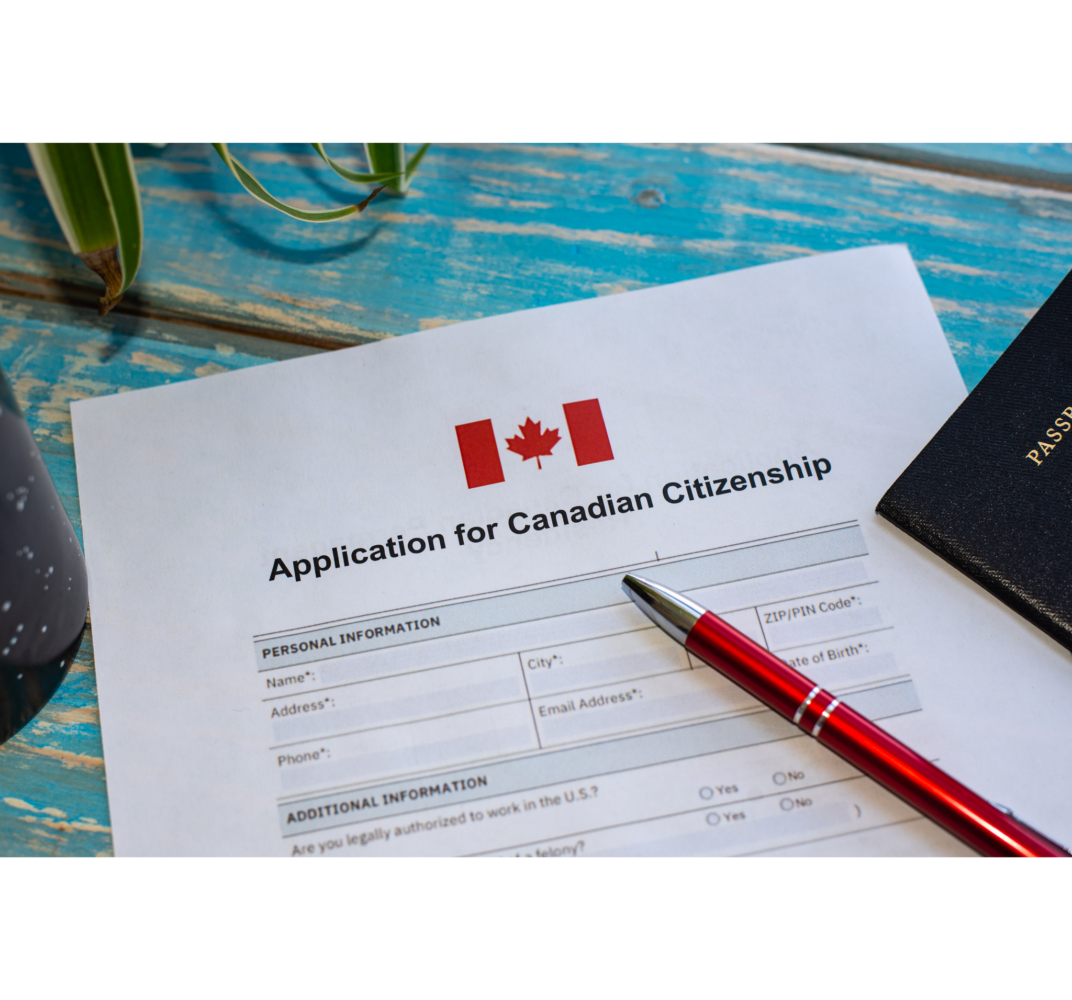
Ultimately the most prestigious immigration status in Canada. Permanent residents living in Canada are eligible to apply for Canadian citizenship. A Canadian passport allows you to travel visa-free to more than 180 countries around the world.
To qualify for citizenship, the applicant must:
- Be a permanent resident;
- Have lived in Canada for at least 3 out of the last 5 years (1,095 days) preceding the application;
- Have filed taxes during the period of their residence in Canada;
- Take and pass a Canadian citizenship test;
- Be able to speak English or French.
If Canada sounds like the right country for you, let Phan Immigration immigration help you with applying for your Canadian student visa.
Ignite your dreams. Go further.





